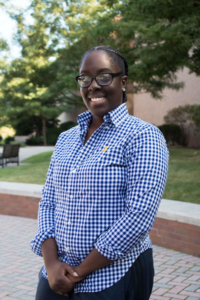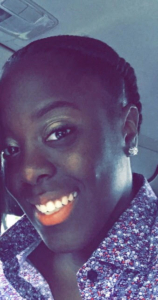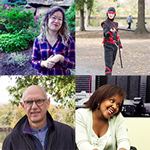Faces Behind the Screen: Bridgit Brobbey
Quick Links
<< Return to all “Faces Behind the Screen” stories
Bridgit Brobbey is a student at Rochester Institute of Technology (RIT) in Rochester, New York. She identifies as hard of hearing.
Growing up in a home with strict and traditional customs, Bridgit has struggled to find her identity. However, since attending RIT, Bridgit has been able to immerse herself in a community that is both open and accepting.
Although she feels comfortable to be herself at school in Rochester, Bridgit still struggles to be her full self with her family, in New York City. She is still on her journey of discovering herself and hopes that by sharing her story, she can reach deaf and hard of hearing people who may be struggling with finding their identity. This is her story:
Part One
I am a proud Ghanian-American. I was born in New York City, but my family is originally from Ghana. Growing up, my parents were very strict. They were old-fashioned and traditional. My siblings and I were taught to respect our parents and our elders. We also were expected to excel in our academics and exude proper behavior. We always wanted to make our parents happy.
I wanted to meet the high expectations my father had for me, so I made sure to finish school. He paid for everything: my cochlear implants, my school fees, and my accommodations over the years. I tried my best to meet his expectations, although I felt limited in what I was allowed to do. I couldn’t do anything about changing their rules and expectations because they were used to traditional African customs.
My parents forced me to get a mainstream education in a school with all hearing kids, instead of going to a deaf school. They said I would get a better education there. My dad would tell me that the students in deaf schools weren’t smart, and I had no choice but to attend school with hearing kids.
Being the only deaf person in my school, I was often bullied. As a result, I didn’t have a lot of friends. I had low self-esteem and I didn’t know who I was. Unfortunately, I didn’t have the kind of relationship with my parents that I could confide in them and share personal information. Oftentimes, there was nothing I could do except keep it to myself. I didn’t have heart-to-heart conversations with my family, and there was no warmth or empathy. It was really hard for me because I wasn’t exposed to any deaf role models that could give me guidance.
When I was ready to apply to college, I told my mom and dad that I wanted to be in the NTID (National Technical Institute for the Deaf) program at RIT (Rochester Institute of Technology) in Rochester, New York. My parents didn’t want me to go because they didn’t want me to be associated with anything “deaf”. They wanted me to be with hearing students.
It was important to me that I find my identity. How am I going to figure out who I am? I wanted to discover all the different pieces of myself that made up my identity. It was always a struggle for me to do this growing up in spaces that weren’t deaf. My sister and brother had an easier childhood and were able to discover their identities much earlier than me because they were both hearing. As a deaf person, I had a lot of limitations put on me. It was assumed that I didn’t have the option to go out in the world and do whatever I wanted, like my siblings.
After a lot of convincing, my parents eventually agreed to let me go to RIT. When I went to RIT it was a huge culture shock. For the first time, I learned about the Deaf community and I was exposed to ASL. I saw people who were fluent in ASL and were very visual when they signed. I was never allowed to learn ASL throughout my childhood. I was forced to be completely oral.
My whole entire life I didn’t know that this community existed, so when I came to RIT I was thrilled. Everyone was at ease with who they were, which was nice since I didn’t have the opportunity to do that.
At age 14, I knew I was a lesbian. I knew that I wouldn’t be judged by the community at RIT. I knew that I would be respected for the person I was.
I live a double life. One at RIT and one at home, in New York City. Here in Rochester, I know who I am, I know who my friends are, and I’m out and proud. When I’m home, I have to put on a mask and hide pieces of my identity. Whenever I go home I feel stuck and uncomfortable. It’s exhausting going back and forth between these two identities.
As a black woman who is deaf and a lesbian, I can’t gauge how people will react to my identity. I know that my identity will be respected at Rochester, but when I go home to New York City, it’s always a question. It’s been a really harrowing experience and because of it, I’ve struggled with depression.
As a result of my experiences, I’ve become private about my personal life. I have to limit myself when I’m around my family. My dad expects me to marry a man. He’s asked me if I’ll get married, and it was uncomfortable because I’m not ready to come out to him.
As it gets closer to graduation and I get ready to go to Graduate School, I’ve realized that I’m still stuck. I’m still trying to think about who I am. That’s the journey that I’m on right now.
Part 2
I was born deaf, but I eventually had cochlear implant surgery. That’s why I consider myself to be hard of hearing, although some people may consider me to be deaf – that’s okay with me too!
As a child, going to a mainstream school was extremely difficult. Out of 1,500 students, I was the only deaf student. I was bullied from the third grade until about the eighth grade. I would get beat up and had things stolen from me – including my implants. They were thrown in the trash.
Students made fun of the way I pronounced words when I read aloud in class. They would make me feel silly and stupid by testing to see how I would pronounce words.
These are all things I kept away from my parents. They didn’t know the severity of the situation when I told them I wanted to go to a deaf school. As a result, I became depressed in the sixth grade.
I used to wish I could be hearing. I wanted to be able to participate in simple things like family dinners. When I couldn’t understand the conversation, I was told “later” or “never mind”.
These are things that don’t leave me. At 25 years old, I still think about the pain I went through as a child. It was very traumatic. I was alone. Then I went to RIT.
Once I came here, I realized I wasn’t alone. Since attending RIT, all of these doors opened for me. It really helped me figure out where I wanted to go on my journey.
I became a leader in my community. I started mentoring and counseling other students who were struggling on their journeys. I’m 100% supportive of the people I work with and I’m known on campus for that.
I even started working at the RIT gym. Everyone is patient and takes their time to gesture, and it’s made a huge difference in the workplace. I really like how they make an effort. They’ll communicate with gestures, pen and paper, or anything else that helps! I’m even happy to teach others sign so we can communicate. They’ll say, “how do you sign this or that?” From what I experienced as a child, it makes such a huge difference to see people who are open to me as a hard of hearing person.
Part 3
I’ve experienced a lot of discrimination over the years. For example, when I fill out job applications, I get turned down because of my hearing loss. Some employers don’t even give me the chance to prove that I can do the work. It’s hard for them to accept me as a hard of hearing applicant. Their concern is that I can’t talk on the phone. Primarily, that’s what they come back to me saying, but there’s so much technology now to work around that. It’s really a simple solution.
It becomes frustrating because I have to explain my disability to employers when I go for interviews. I’m nervous because I’m graduating soon and I have to go out into the real world to find a job. It makes me wonder, am I going to be rejected at every turn?
Luckily, RIT is fantastic about communication access. It’s a very accessible campus. They provide closed captioning, interpreters, and note-takers for deaf and hard of hearing students. They give students with disabilities everything they need to succeed so that we can be on an equal playing field with other students. I don’t even have to request for accommodations – it’s just there. As soon as I register for a course, it happens automatically behind the scenes and there’s not extra work on my end. It’s a drastic difference from my childhood educational experience.
There’s a big deaf community here in Rochester. If you go to a McDonald’s, the employees know how to communicate through gesture or sign language. There’s even touch screen machines to make orders.
At the cinema, there are even open-captioned films. I’ll go up to an employee and tell them I’m hard of hearing, and they say, “No problem. We have movies with open captions.” I’m like, “wait, you can just walk in?!” It’s great here. RIT has really affected the wider community of Rochester as well, so I feel at home.
The best thing about being deaf or hard of hearing is living at RIT. It has been one of the best decisions of my life because now I’m proud to be apart of the deaf community.
Learning ASL has changed my life as well. Since I grew up oral, I learned very little sign. Coming to RIT, I saw sign language everywhere – in the hallways, on the streets – so I had a lot to learn. I didn’t even know that ESL and ASL were different.
ASL is a beautiful language. It’s full of facial expressions, attitude, and culture.
I even learned Black ASL or BASL. It’s more nuanced than ASL. When I get together with groups of people who are African-American or Caribbean, there’s a way we sign that makes me feel rooted in my identity and in my culture as a person of color. The same way hearing people use inflections in their tone of voice, is what we do with sign language. It speaks to me on a cultural level because I know more about deaf culture and black culture and how the two commingle.
After I receive my undergraduate degree, I plan on going to graduate school. Once I’m done with school, I want to set up a non-profit leadership organizations. I want to help other young African-American people who are living a double-life and who’ve experienced what I’ve been through. I want to help them follow their hearts and do what makes them happy.
I’ve been through a lot in my life and I let my past define me for a long time – until I moved to RIT. I’ve grown into an independent person and I’ve discovered who I am as a person. I hope my journey can be an example to others.
—
Faces Behind the Screen would like to congratulate Bridgit Brobbey for graduating and for participating in our storytelling project. If you’re interested in sharing your story with us, fill out our nomination form.
Faces Behind the Screen is a storytelling project focusing on members of the Deaf and hard of hearing community.






